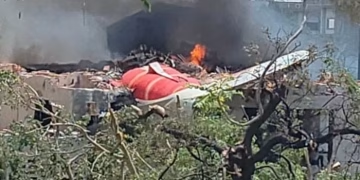At least 25 people are missing after a landslide at an unregulated jade mine in a remote region of Myanmar, rescue workers said Monday.
The incident on Sunday outside northern Kachin’s Hpakant township — near where hundreds of miners were entombed in a landslide in 2020 — comes days after much of the country was swamped by torrential rain and floods.
The highly lucrative jade mining industry is mostly unregulated, with migrant workers enduring dangerous conditions and frequently deadly accidents.
“About 25 people went missing. We haven’t got a detailed list as it’s difficult to get here,” one rescue worker, who did not want to be named, told AFP from the scene.
He described how a massive pile of earth about 150-180 metres (500-600 feet) high left behind by mining excavations was loosened by the intense rains and collapsed.
Search and rescue missions were continuing, he said, but some workers had already returned to the scene in the hope of finding jade.
“We haven’t found any dead bodies yet,” he said.
Another rescue worker confirmed to AFP that attempts to recover people were ongoing despite fears of secondary landslides.
“It is not safe for rescue workers to search it,” said the individual, who was with the emergency group Myanmar Rescue and also requested anonymity.
He added that the mine’s operations had been suspended during the rainy season, but those caught in the landslide were believed to be locals hoping to strike it rich by scouring the mud.
Dozens die annually while working in the poorly regulated but lucrative jade industry, which uses low-paid migrant workers to scrape out a gem highly coveted in neighbouring China.
Jade and other abundant natural resources in Myanmar’s north — including timber, gold and amber — have helped finance both sides of a decades-long civil war between ethnic Kachin insurgents and the military.
Control of the mines sees civilians trapped in vicious fighting, with a rampant drug and arms trade further exacerbating the conflict.
While environmentalist and rights groups have long called for reforms, a 2021 military coup effectively ended hopes for better standards in the industry, according to international watchdogs.

































